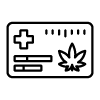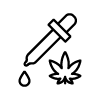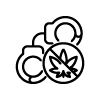Cannabis Laws in Suriname

Fully Legalized for Adult Use?

Fully Legalized for Medical Use?

CBD only?

Decriminalized?
Disclaimer: This information is provided for general informational purposes only and may not reflect the most current legal requirements in Suriname. Cannabislaws.global recommends you consult with a qualified local attorney or legal expert for accurate and up-to-date information. This information is not intended as legal advice and should not be relied upon as such. Use of this information is at your own risk.
Does Suriname have a recreational use program?
No, Suriname does not have a recreational use program. Strict drug laws are in place throughout the nation, such as the Opium Law of 1976, which makes it illegal to produce, traffic, or possess cannabis.
Does Suriname have a medical program?
No, Suriname does not have a medical use program. Suriname does not currently have any laws or regulations permitting the use of medical marijuana, even with a growing number of countries around the world legalizing it under a prescription.
What are the rules for medical use?
There is no medical use program in Suriname.
What are the qualifying medical conditions for eligibility?
There is no medical use program in Suriname.
What are the medical program limits?
There is no medical use program in Suriname.
What methods of use are permitted under the medical program?
There is no medical use program in Suriname.
Is there home delivery for medical cannabis?
There is no medical use program in Suriname.
Is CBD legal in Suriname?
No, CBD is not legal in Suriname. The drug laws of Suriname classify CBD as a controlled substance even though it does not give users the same high as marijuana.
Is cannabis decriminalized in Suriname?
No, cannabis is not decriminalized in Suriname. Cannabis-related offenses can result in harsh penalties as Suriname strictly enforces its drug laws.
Depending on the type of offense and the quantity of cannabis involved, those found guilty may receive long prison terms. Significant fines may also be imposed on offenders; these can change based on the seriousness of the offense. Any assets—including real estate and automobiles—connected to drug offenses may be seized by the government.
Foreign nationals who are caught in Suriname engaging in cannabis-related activities may face harsher penalties.
Disclaimer: This information is provided for general informational purposes only and may not reflect the most current legal requirements in Suriname. Cannabislaws.global recommends you consult with a qualified local attorney or legal expert for accurate and up-to-date information. This information is not intended as legal advice and should not be relied upon as such. Use of this information is at your own risk.

CannabisLaws.global
Your global guide to cannabis laws

Suriname Legal Aid
contact [email protected] to own this page
